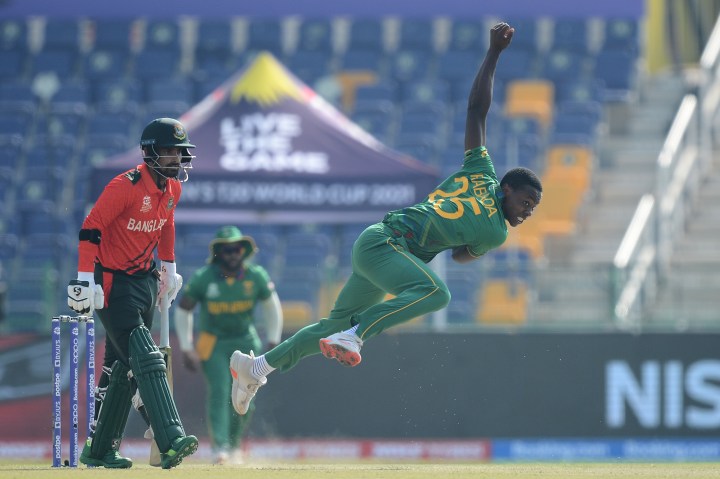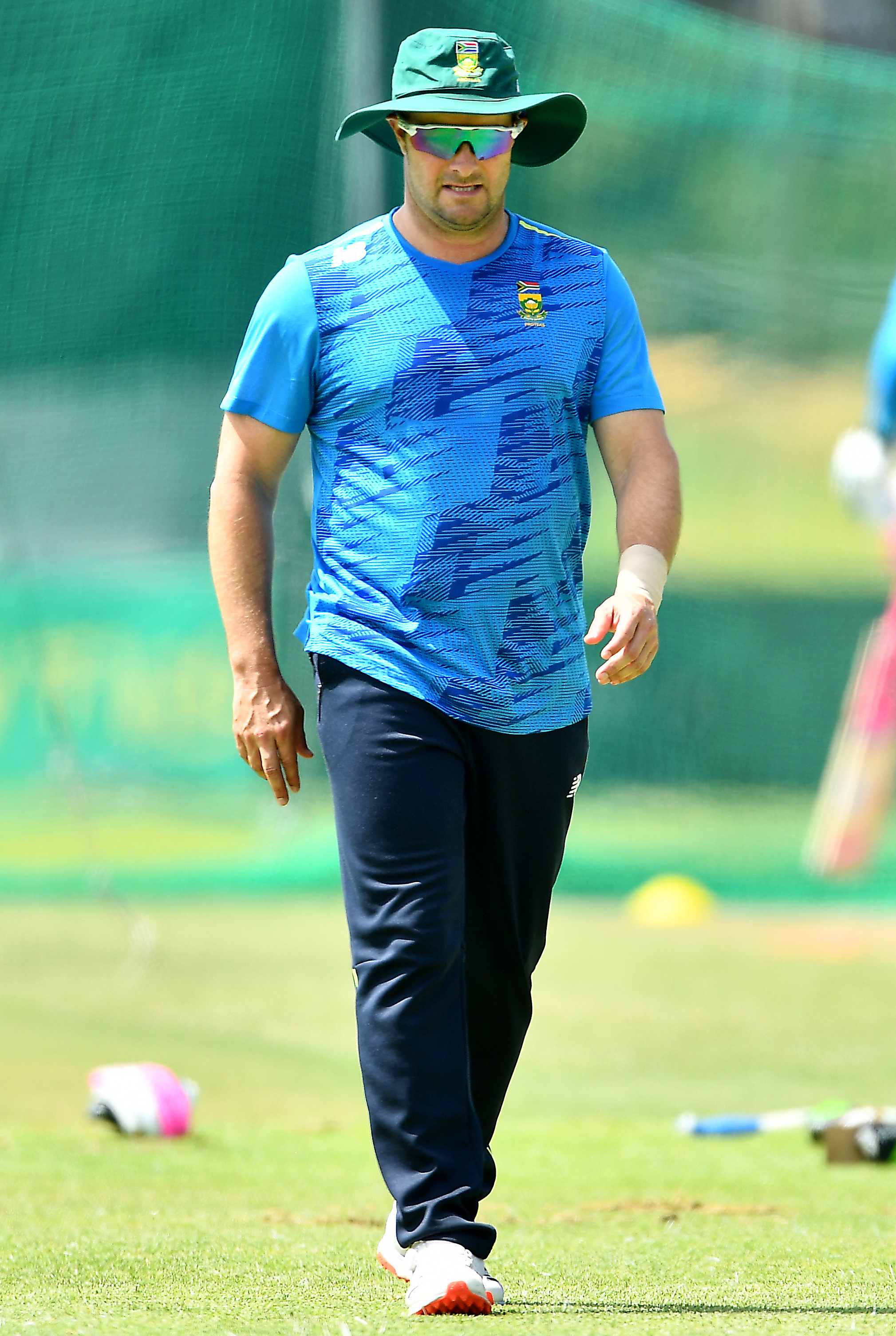WICKET GAME
Proteas on the right track after two years of slow, steady growth

It looks like a strong T20 World Cup campaign, with the Proteas on the hunt for a semifinal place going into the final round of the Group stages. Just winning against England would be notable.
Cricket World Cups and the Proteas seem destined never to mix, as another campaign looks set to end in agony for a South African team that has performed above expectations at the current T20 World Cup.
Before a ball was bowled at the seventh staging of the T20 World Cup, being held in the United Arab Emirates, the Proteas were not among the leading contenders for the title.
England, India, New Zealand, Australia, Pakistan and even the reigning champions West Indies were viewed as superior 20-over teams to the Proteas. So, the fact that South Africa were in with a chance of making the semifinals at the time of writing is clear evidence that there has been improvement and growth.
The irony is that the Proteas could end the group stages on eight log points with England and Australia and still not advance to the semis because of an inferior net run rate (NRR).
The top two teams in each group advance to the semifinals.
NRR is a fairly complex calculation and is explained by leading cricket website ESPNCricinfo thus: “A team’s net run rate is calculated by deducting from the average runs per over scored by that team throughout the competition, the average runs per over scored against that team throughout the competition.
“In the event of a team being all out in less than its full quota of overs, the calculation of its net run rate shall be based on the full quota of overs to which it would have been entitled and not on the number of overs in which the team was dismissed,” it says.
This calculation excludes games that are abandoned or cancelled and there are further calculations for matches decided on the Duckworth/Lewis system, which is usually applied when rain forces an innings to be shortened.
The Proteas final group match against the seemingly invincible England on 6 November will finalise the standings of the group.
The only guarantee, it seems, is that England, who were already on eight log points going into the final fixture, will advance even if they lose to South Africa, because of their vastly superior NRR. A tight Proteas win over England would not move the NRR needle much either way. And it’s unlikely the Proteas will thrash England – just winning that match would be an achievement.
Australia’s final group game against the West Indies, earlier on the same day, will see them move to eight log points if they win – and they should, considering the Windies’ poor form at the tournament. Going into the final round Australia’s NRR was superior to South Africa’s and victory over the West Indies would bolster it further.
Which means South Africa are unlikely to advance to the semifinals even if they beat England. Their only hope is that the West Indies somehow beat Australia.
And the other advantage the Proteas have is that their game follows the Australia vs West Indies encounter.

Mark Boucher during a Proteas training session at Eurolux Boland Park in Paarl on 25 November 2020. (Photo: Ashley Vlotman/Gallo Images)
South Africa will know exactly what they need to do to qualify when they take the field.
The current situation underlines how fine the margins are. As it stands, the Proteas are set to fall on the wrong side of the line – again. But, regardless of the outcome in the final matches, after two years of slow growth, this might prove to be a watershed tournament and a time for Cricket South Africa (CSA) to hold their nerve.
Boucher and beyond
If the Proteas fail to reach the semis there will be calls for coach Mark Boucher’s head, even though the team exceeded expectations in the UAE.
Blaming the coach is easy, but in terms of performance it’s not really a stick he can be beaten with. Over a fraught two years at the helm, during which CSA boardroom politics undermined everything in the cricketing ecosystem, the Proteas have developed increasing clarity and shown growth.
After struggling through a disrupted 2020, before Saturday’s meeting against England the Proteas have won 12 of their last 15 T20 international matches. In ODI cricket in the Boucher era, they have won one series, lost one and drawn one. In Test cricket under Boucher, they won two series, lost two, won five Tests and lost five.
In the white ball game, the Proteas’ development has been built on a settled formula. Using the spin of Tabraiz Shamsi, Aiden Markram and more recently Keshav Maharaj to complement the pace of Kagiso Rabada and Anrich Nortje, they have developed a formidable bowling unit.
They have also developed strong leaders who take more responsibility for their roles. None has been more impressive than white ball captain Temba Bavuma. He has not only emerged as an important white ball batter, but also as a composed, strong and empathetic leader.
Despite what outsiders believe, sources close to the camp say Bavuma shares a good relationship with Boucher, which is crucial to building a winning team. Others such as Markram and Nortje have embraced the added responsibility of being match-winners and being used in creative ways, while Rabada is unquestionably the enforcer – cricket’s equivalent of Duane Vermeulen in the Springbok rugby team.
Shamsi relishes his role of being a match-winner with the ball and Rassie van der Dussen has adapted his game to suit white ball cricket. David Miller is a crucial, if inconsistent, source of quick runs and wicketkeeper Quinton de Kock is slowly rebuilding his confidence after mentally struggling after his brief stint as Test captain.
Considering that Boucher and the selectors spent two years tweaking and fiddling, the balance they’ve achieved is as good as it can be. This is not an era of once-in-a-generation players such as Hashim Amla, AB de Villiers, Dale Steyn, Vernon Philander, Jacques Kallis and Graeme Smith all overlapping. Rather it’s an era of solid professionals collectively working to be a better team.
It’s not as if convenor of selectors Victor Mpitsang and director of cricket Graeme Smith have left out vastly superior players. The reality is the squad in the UAE is as good as South Africa could have selected at this moment.
There has been an argument that Faf du Plessis, who plays his cricket as a free agent, should have been roped in for the T20 World Cup. He was the top run-scorer for the Chennai Super Kings, who won the Indian Premier League (IPL) just days before the T20 World Cup started.
Du Plessis retired from Test cricket earlier in the year and did not have a CSA contract. As a free agent he was eligible for the Proteas if they wanted him, but he was asked to make himself available for one of the recent series against Ireland or Sri Lanka to be considered for the T20 World Cup. He declined, which left Smith no choice but to move on, IPL form notwithstanding.
Off the field
Boucher’s biggest challenge, though, is not what is happening on the field but rather off it – and more particularly what emerged at the recent Social Justice and Nation-Building (SJN) hearings.
Former teammate Paul Adams named Boucher as one of the players who called him a “brown sh*t” during team fines meetings.
“I was called ‘brown sh*t’ and it often used to be a song after we won a game and it would be sung in fines meetings. They would sing: ‘Brown sh*t in the ring tra-la-la-la,’” Adams stated under oath at the SJN.
“Mark was one of the guys and I only really started to think about these things afterwards because I was caught up in the whole fun of being in the team and not wanting to ruffle feathers.”
Boucher subsequently apologised and explained his actions in a submission to the SJN. He also confronted the issue with the team before they departed on tour to Sri Lanka on 25 August, giving his version of events to the squad.
“I have listened to the hurt some of my teammates felt, the feeling of exclusion and some totally unacceptable and inappropriate examples of alleged racism that they endured,” said Boucher in his written response to the office of SJN ombud Dumisa Ntsebeza.
“I apologise unreservedly for any offensive conduct, real or perceived, that has been attributed to me. We, the team, coaching staff, selectors and CSA, during the period in question, should have been more sensitive and created an environment where all members of the team could raise and talk about these issues without allowing them to fester, as they clearly have.”
In the wake of the incident, Bavuma again demonstrated his clear leadership when addressing the media.
“I’d be lying if I said it didn’t have an impact on us as a team. Boucher has addressed us as a team, speaking to the accusations against him,” Bavuma said.
“He provided clarity and context and it was more about keeping the guys in his confidence and comfort.
“As much as we operate as a team and we try to control everything that is in our circle, those matters do come within the team and it’s important that we deal with it internally and ask whatever hard questions that we need to ask of each other to make sure we can keep growing within the team.
“As players now, in this era, we have got an opportunity to shape the environment, to shape the team, in the way that we would like so that down the line we don’t look back and say we could have done things in a different way.”
After a strong T20 World Cup, will the Boucher/Bavuma partnership be allowed to grow? DM168
This story first appeared in our weekly Daily Maverick 168 newspaper which is available for R25 at Pick n Pay, Exclusive Books and airport bookstores. For your nearest stockist, please click here.




















 Become an Insider
Become an Insider
Are you sure about that Craig? Maybe, maybe not. The series against India will be most telling. But my major fear is that the beloved Cricket Board will sooner or later again step in and interfere in team management, selection, or policies.